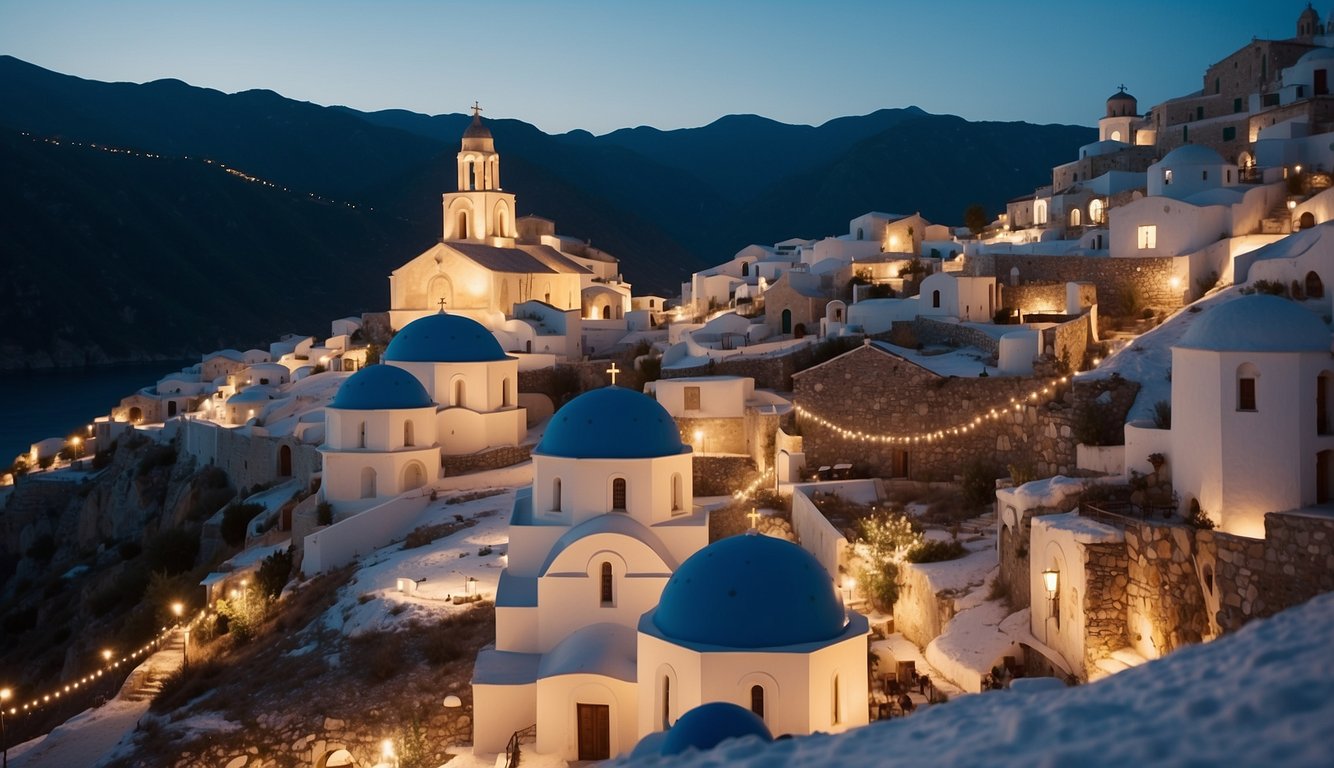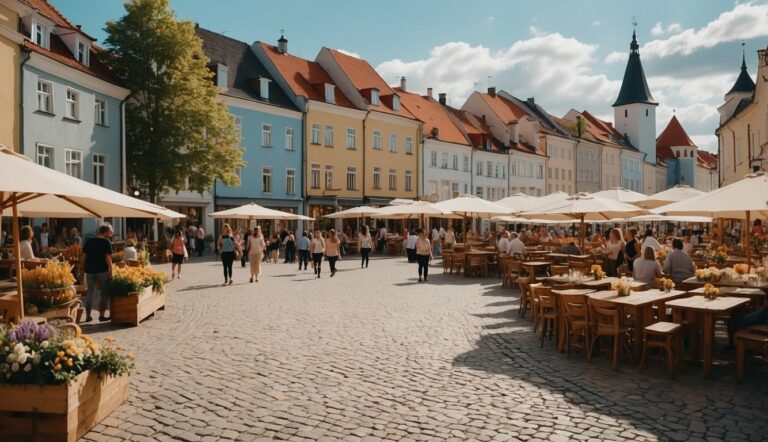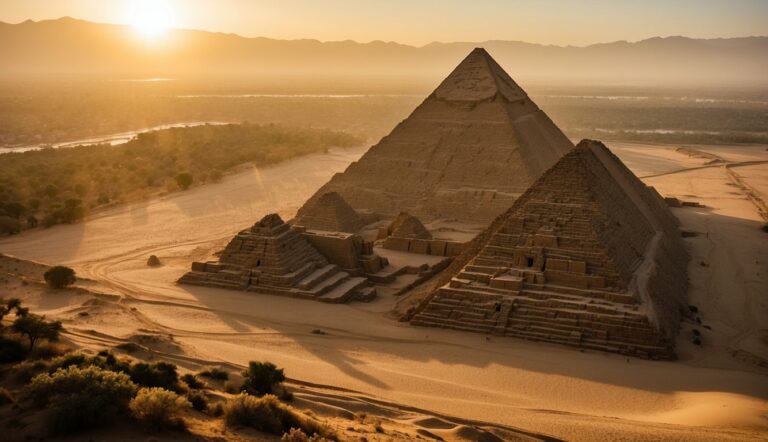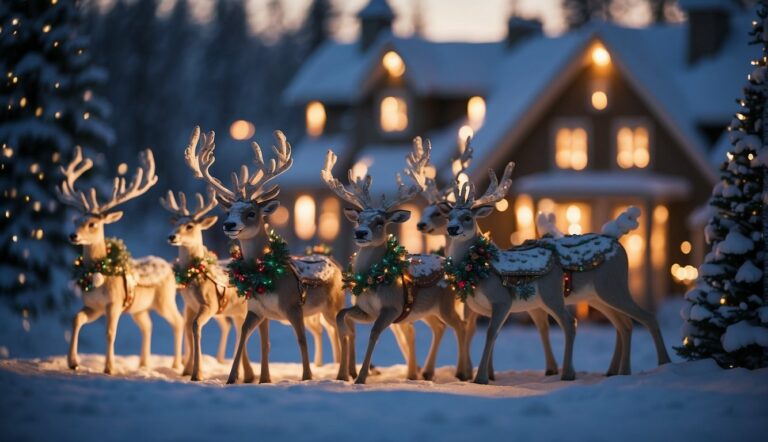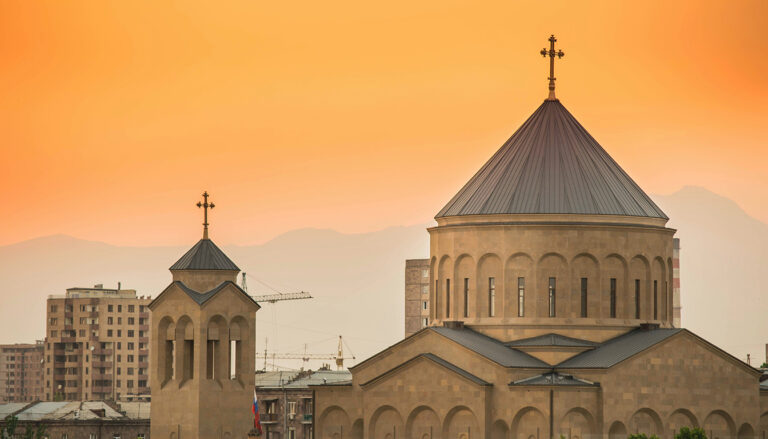Christmas in Greece: Exploring Age-Old Traditions and Customs
Christmas in Greece embodies rich traditions, vibrant celebrations, and gastronomic delights, reflecting the country’s deep-rooted heritage and the importance of togetherness during the festive season.
From the mainland to the islands, Greeks celebrate Christmas with a specific warmth and enthusiasm that is both traditional and family-centric.
The festivities are imbued with a sense of community and spiritual reflection, harmonized with lively customs that date back centuries.

Central to the Greek Christmas experience is the culinary feast that awaits on Christmas Eve.
The tables brim with delectable dishes such as stuffed turkey and an array of sweet treats, including kourabiedes and melomakarona cookies, which are holiday staples.
These culinary practices not only tantalize the palate but also bring families and friends together in a celebration that is as much about the food as it is about unity.
Symbolic decorations and activities further mark the season.
Christmas trees, popular in Greece in the mid-20th century, stand alongside boats adorned with lights, paying homage to the nation’s maritime traditions.
Carolling is a practice that holds a special place in the festivities. Children and adults alike share in the singing of kalanda, the Greek Christmas carols, spreading joy and good cheer throughout neighbourhoods.
Historical Origins of Christmas in Greece
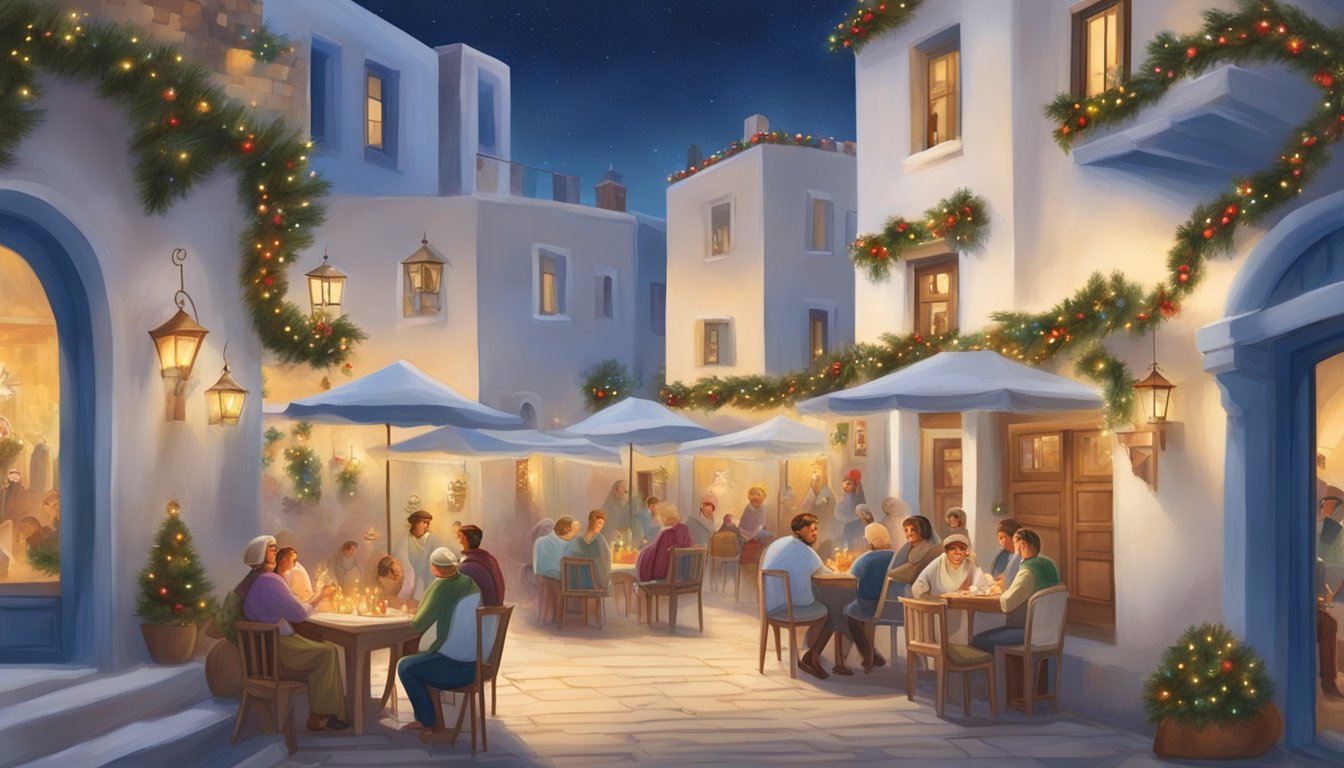
In Greece, Christmas is a festive time imbued with traditions that bridge the nation’s ancient heritage and Christian beliefs. The Greek Orthodox Church plays an integral role in the celebration, with its rituals and customs shaping the holiday season.
Ancient Influences
For millennia, the Greeks have celebrated festivals during the winter. Before the advent of Christianity, ancient Greeks adorned their temples with trees, which were symbolic offerings to the gods.
The continuity of such practices is subtly reflected in the modern decoration of the Christmas tree, an emblem of the season’s joy.
Adoption of Christmas Trees
The Christmas tree was introduced to Greece in the 19th century as a modern tradition. In 1833, Bavarians first decorated the palace of King Otto with a Christmas tree, marking the beginning of a new festive custom that resonated with the older, tree-related ceremonies.
Christian Traditions
Greece’s Greek Orthodox Church ensured the seamless blend of local customs with Christian celebrations of Christmas.
Fastening periods and feasting, such as the indulgence in turkey during Christmas meals, manifest the Greek Orthodox influence.
The Christmas season launches on December 6th, the Feast of St. Nicholas, and extends to January 6th, the Feast of Epiphany, encapsulating reverence and merriment.
Carolling Heritage
Christmas carols are a universal Christian tradition with deep roots. In Greece, carolling can be traced back to ancient times when celebratory songs symbolized prosperity and well-being.
The singing of carols endures as a vital part of Greek Christmas, echoing the harmonious spirit of antiquity.
Greek Christmas Decorations
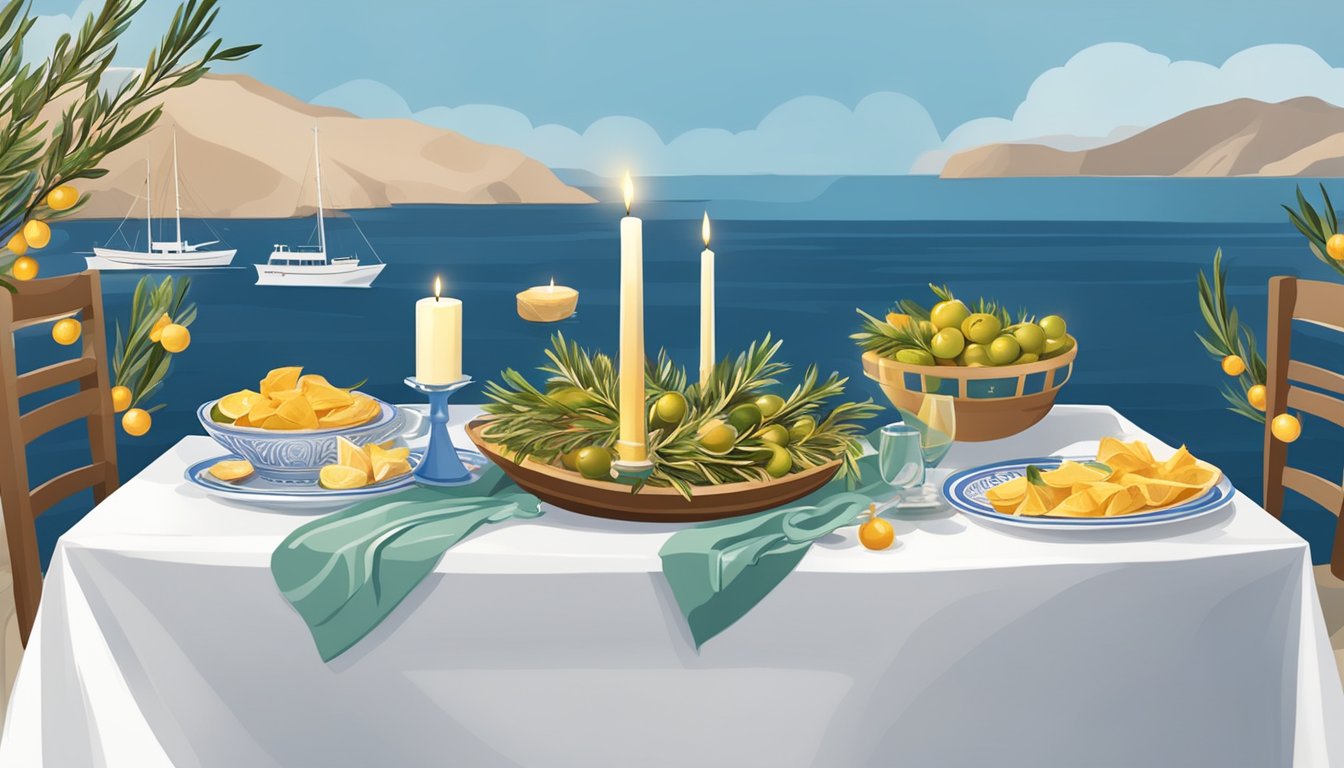
In Greece, Christmas decorations are special, reflecting the country’s traditions and maritime history. These range from the classic Christmas trees to the Karavaki boats, each with its own story and place in Greek holiday culture.
Traditional Decor: From Trees to Boats
Christmas Trees
The Christmas tree concept in Greece was influenced by German and Scandinavian customs. Bavarian Prince Otto brought the tradition to Greece in the 1830s, initially taking root among the aristocracy before spreading to the wider population.
Today, Greeks often decorate their Christmas trees with international and homemade ornaments.
Karavaki Boats
A uniquely Greek tradition is the decoration of small boats, known as Karavaki.
These boat decorations pay homage to Greece’s strong connection to the sea and its maritime past.
Typically, the boats are wooden and adorned with lights and miniature ornaments, symbolizing the anticipation of sailors returning home for the holidays.
Modern Decorations and Lights
The evolution of Greek Christmas decorations mirrors the blend of tradition with contemporary tastes.
Modern Greek homes and public spaces are frequently adorned with vibrant light displays and intricate ornaments that complement the classic decors.
Greek cities and towns are known for their elaborate light installations during the holiday season, creating a festive atmosphere for locals and visitors.
Alongside the traditional decorations, Greeks often incorporate modern elements such as electric garlands, colourful baubles, and sophisticated light technologies to brighten their homes and workspaces.
Festive Foods and Sweets

Greek Christmas cuisine is known for its rich and diverse flavours, incorporating a blend of savoury meats and sweet confections that celebrate tradition and togetherness.
Main Dishes
On Christmas Eve, a traditional feast includes Pork and Celery Stew, a heartwarming dish often made lemony with an egg and lemon sauce.
Families also enjoy stuffed turkey, richly flavoured with local herbs and spices, signifying the centre of the Greek Christmas table.
Pork and Celery Stew: A traditional Christmas Eve stew with a tangy lemon and egg sauce.
Turkey: Often stuffed and seasoned, serving as a festive main course.
Desserts and Treats
Sweet delights play a significant role in Greek Christmas festivities.
Melomakarona and kourabiedes are the star treats of the season.
Both are made with the staple ingredients of olive oil, honey, and nuts and are adored across Greece.
Melomakarona: Honey cookies with walnuts soaked in honey syrup and sprinkled with ground walnuts.
Kourabiedes: Shortbread cookies rich in butter, covered with powdered sugar, and often containing a hidden clove.
Symbolic Foods
The New Year brings the slicing of Vasilopita, a sweet bread or cake with a coin hidden inside.
Whoever finds the coin is said to have good fortune in the upcoming year. This bread is often made with flavorful spices and decorated with almonds.
Customs and Traditions
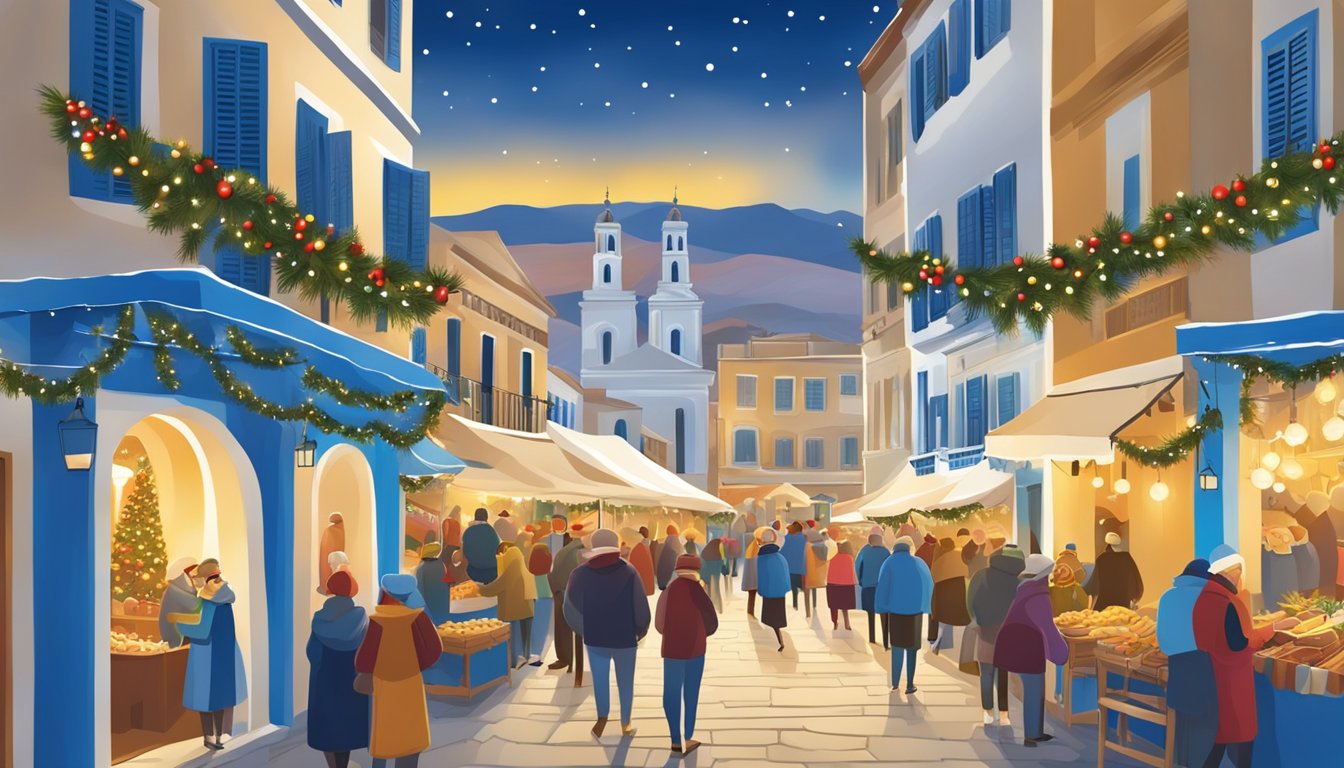
Greek Christmas customs intertwine rich religious heritage with communal joy, encompassing everything from carolling to symbolic rituals for prosperity.
These traditions stitch together an intricate tapestry of celebration and significance, deeply cherished by the population.
Caroling and Kalanta
On Christmas Eve, New Year’s Eve, and Epiphany Eve, Greek children take to the streets to sing carols known as Kalanta.
These Greek Christmas Carols resonate through neighbourhoods, heralding the festive period.
Bearing musical instruments, the children are often rewarded with sweets and coins, signifying the spread of good fortune.
The Feast of Saint Basil
Saint Basil—the Greek version of Santa Claus—delivers gifts to children not on Christmas but on New Year’s Day, his feast day.
On this occasion, families cut the Vasilopita, a special bread with a coin hidden inside.
Whoever finds the coin in their slice is said to receive good luck and prosperity for the year ahead.
Epiphany and the Blessing of the Waters
January 6th marks the Epiphany, a celebration of Jesus’ baptism where priests across Greece cast a cross into the sea, rivers, or lakes to bless the waters.
The young dive in, racing to retrieve the cross. It is believed the person who finds the cross will be granted good fortune for the entire year.
Christmas Activities and Entertainment
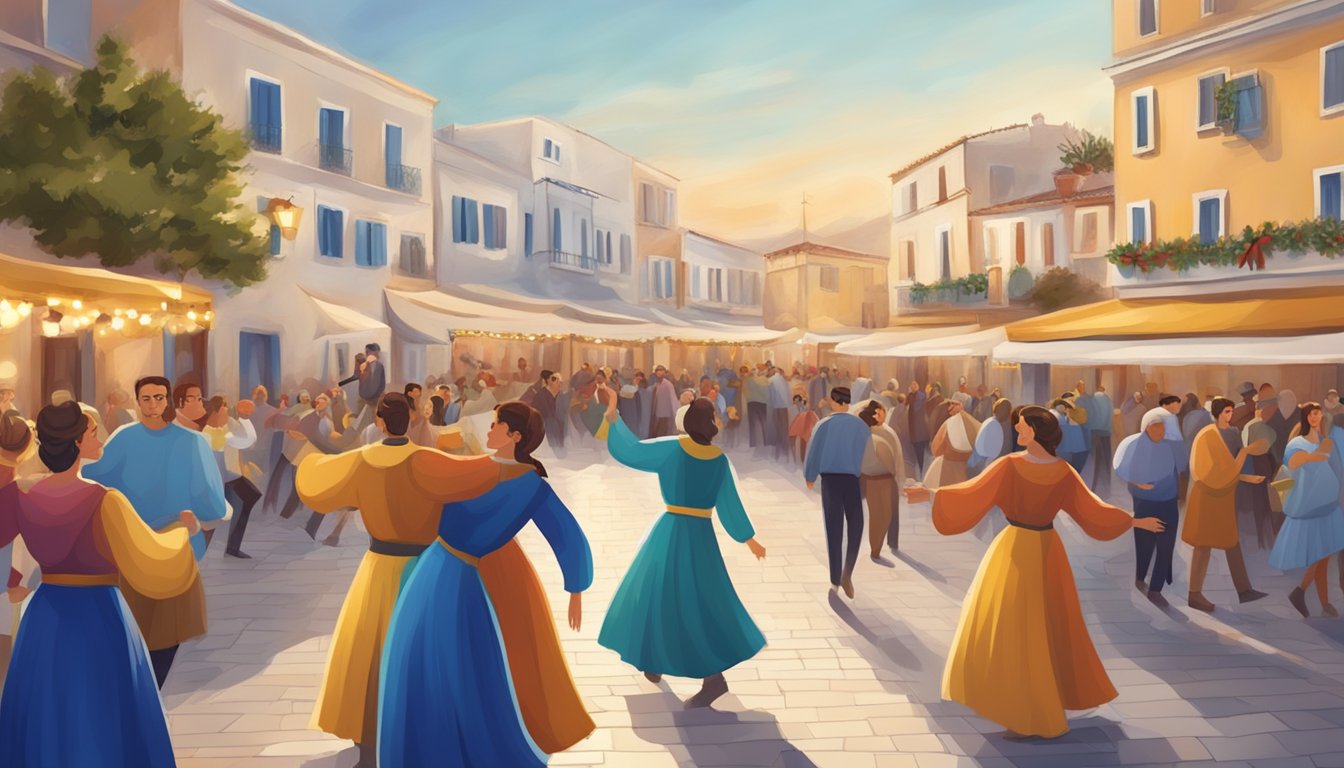
During the festive season, Greece becomes a hub of vibrant activities and events catering to various interests and ages.
Whether you want to immerse in the sounds of music or browse through festive markets, there’s something to be found for everyone.
Music and Concerts
Greece’s musical scene flourishes during Christmas with various concerts and live performances.
In Athens, seasonal music events ranging from classical concerts to modern live acts are held at venues like the Stavros Niarchos Foundation Cultural Center.
Thessaloniki also showcases a blend of musical festivities, often spotlighting local artists and international talents.
Markets and Bazaars
The Greek tradition of Christmas markets and bazaars is a highlight of the season.
Athens
Syntagma Square becomes the celebration centre with a splendid Christmas Market with shops offering holiday crafts, decorations, and local culinary delights.
Visitors can stroll through the market, experiencing the aromas of mulled wine and fresh pastries while shopping for gifts.
Thessaloniki
The heart of the city’s festivities is Aristotelous Square, where themed bazaars offer a similar array of festive wares and treats.
With craftspeople and artists from across the country, attendees can purchase unique gifts and experience the vibrant community spirit firsthand.
Regional Celebrations

The regional celebrations of Christmas in Greece spotlight the remarkable diversity of traditions, each with its distinctive character influenced by the local culture and history.
Island Festivities
The Greek Islands are renowned for their unique yuletide customs.
On many islands, ships are the focus of decoration, a nod to Greece’s maritime heritage.
Islanders in Chios decorate model ships with lights and embark on carolling expeditions, a tradition known as kalanda, offering well wishes for calm seas and prosperous voyages.
Ikaria residents engage in communal feasts and traditional dancing, a physical expression of the islands’ communal spirit during the festive period.
On Crete, villages like Plaka immerse themselves in age-old rituals, including the baking of kalitsounia, cheese-filled pastries that are a Cretan speciality during Christmas.
Mainland Greece Traditions
In contrast, Mainland Greece adopts a more varied set of customs.
In Thessaloniki and Trikalapublic, public squares often feature large, illuminated Christmas trees and vibrant markets that capture the season’s joy.
The mountainous regions of Arachova and Metsovoare famous for their winter festivities, including music, dance, and the roasting of chestnuts.
Agios Athanasios is known for its timber-framed buildings and cobblestone streets. This village transforms into a winter wonderland with Christmas markets and distinctive local celebrations that showcase the rich cultural tapestry of Greek Christmas traditions.
In these settings, the community is paramount, and holiday activities are centred around bringing people together, marking the season with a tapestry of cultural touchstones that make the Greek Christmas experience both diverse and unified.
Christmas in Athens
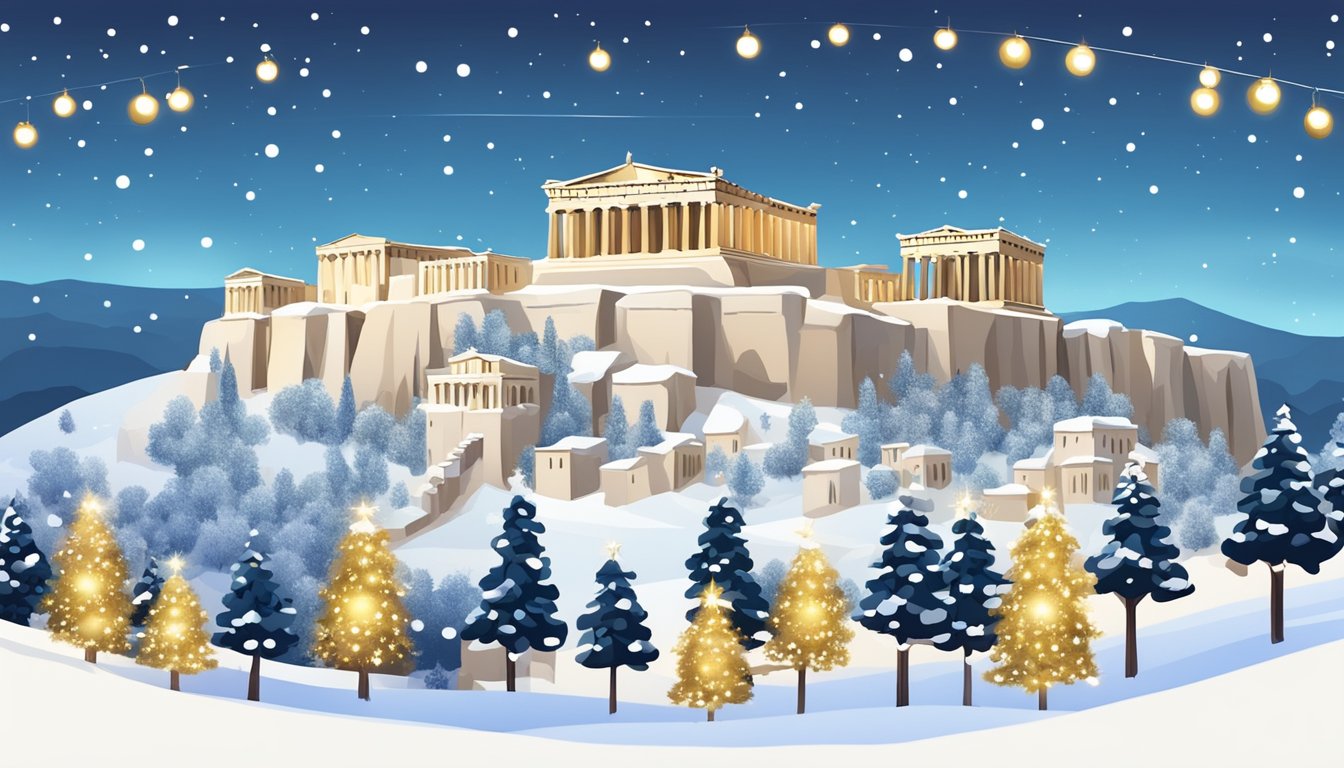
During the festive season, Athens transforms into a vibrant tableau of holiday cheer.
Celebrations commence on December 6th, coinciding with the feast day of St. Nicholas, and continue through to January 6 with the Feast of the Epiphany.
Syntagma Square serves as the heart of the celebrations.
Here, visitors can immerse themselves in a Winter Wonderland with a glistening Christmas tree, vibrant decorations, and merry tunes setting a festive ambience.
Greek Christmas Traditions
Greeks enjoy traditional foods such as melomakarona (honey cookies) and kourabiedes (almond shortbread).
Agios Vasilis (St. Basil) is the Greek counterpart of Santa Claus, bringing gifts to children on New Year’s Eve.
Greeks also incorporate milk into holiday recipes, crafting rich, creamy drinks and desserts synonymous with the season’s indulgence.
Shopping for unique gifts in the illuminated Athenian streets provides another layer of enjoyment for locals and tourists.
Cultural sites like the Acropolis remain open, allowing for a juxtaposition of ancient history and modern festivities.
Museums and archaeological sites are also popular destinations, as they often stay accessible over the holidays.
Notable Public Festivities
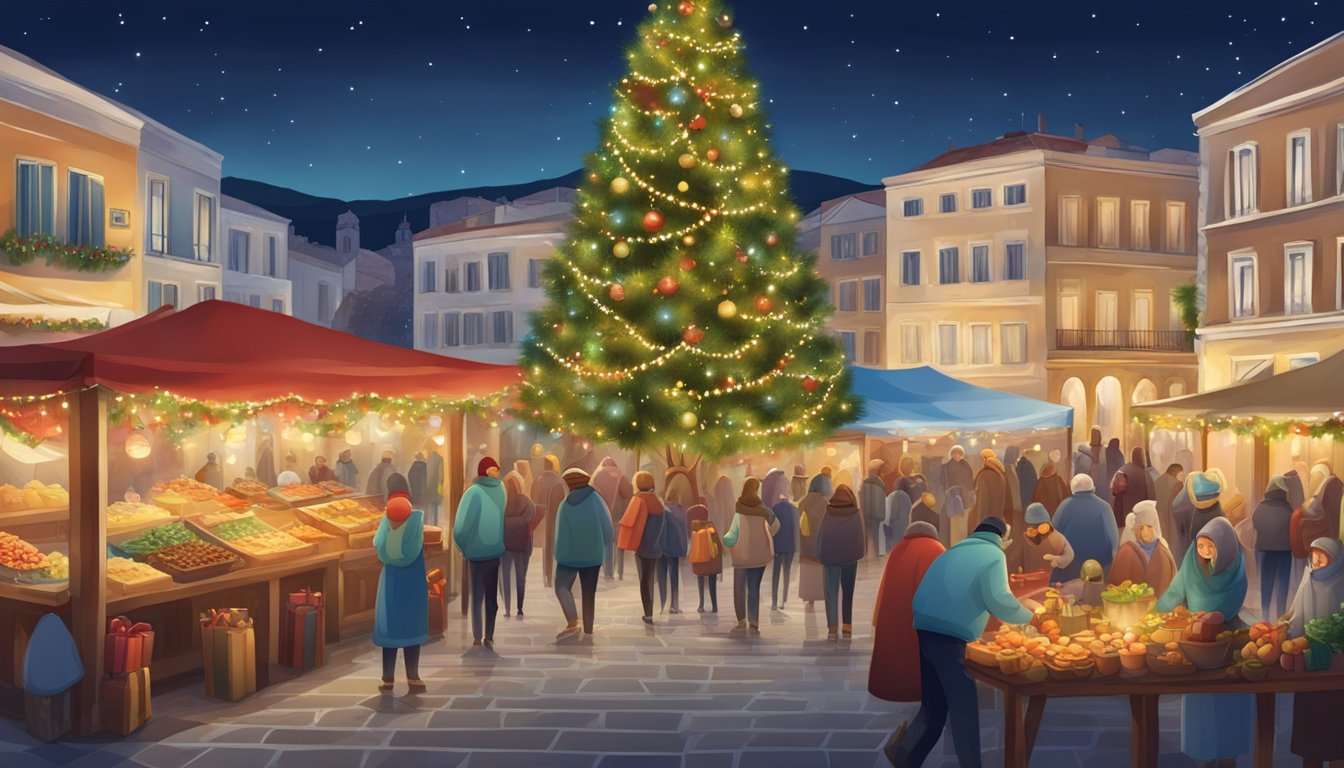
In Greece, the Christmas season is marked by vibrant public festivities, highlighted by mesmerizing Christmas lights in Thessaloniki and traditional winter celebrations in the mountain town of Arachova.
Thessaloniki’s Christmas Lights
Thessaloniki, Greece’s second-largest city, transforms into a winter wonderland each December.
The city’s waterfront and main squares are adorned with a spectacular display of Christmas lights.
These illuminations are not just simple decorations; they narrate stories of the season and reflect the city’s deep-rooted history and cultural heritage.
With its impressive light art, the waterfront draws locals and tourists alike, creating a collective sense of joy and wonder.
Arachova’s Winter Celebrations
Arachova, a scenic mountain village draped in snow during the winter, hosts annual celebrations steeped in tradition and local folklore.
Christmas time in Arachova is particularly magical due to its combination of beautiful landscapes and lively events.
Here, visitors can witness the enchanting dance of the Kallikantzaroi, mischievous spirits from Greek folklore said to surface during the 12 days of Christmas.
The village is alive with music, traditional Greek dances, and hearty local cuisine, offering an intimate glimpse into winter festivities that echo through the cobblestoned streets.
The Spiritual Aspect of Christmas
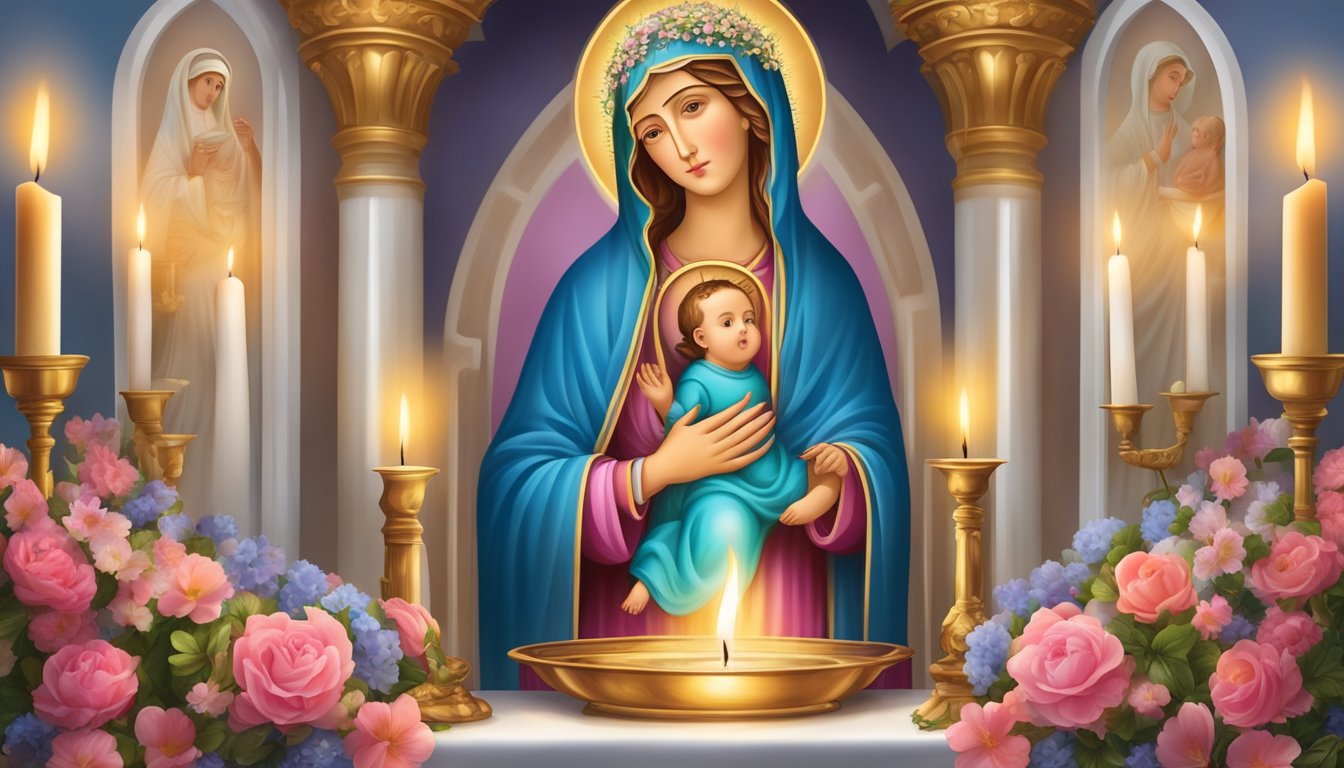
Christmas in Greece is inextricably linked to the Greek Orthodox Church, which plays a central role in celebrating the holiday.
The season is marked by deep spiritual significance and religious traditions highlighting the Greek people’s devotion to their faith.
Services and Rituals
The Greek Orthodox Church presides over various services during the Christmas period.
Priests lead the congregation in liturgies that underscore the birth of Jesus Christ.
Notably, the Christmas Eve and Christmas Day services attract the devout to participate in Midnight Mass, reflecting on the holiday’s religious roots.
Feast of Saint Basil
January 1st is the start of the New Year in Greece and the Feast of Saint Basil (Agios Vasilios).
Saint Basil is one of the foremost figures of the Greek Orthodox Church, revered for his kindness and contribution to Christianity.
His feast day coincides with the tradition of the Vasilopita, a special cake or bread baked with a hidden coin, symbolizing luck and blessings for the coming year.
Home Blessings
In the days following Christmas, priests visit homes to sprinkle holy water.
They carry a sprig of basil dipped in water, a practice symbolizing purification and the renewal of life.
This act is a reminder of the sanctity of the household and its connection to the spiritual life of the church community.
Community Engagement
Local parishes and communities enjoy carolling and other festive activities, expressing joy and unity.
These traditions serve as spiritual and cultural expressions, further tying the celebration of Christmas to the collective identity rooted in Greek Orthodoxy.
Gift-Giving and Exchanging

Gift-giving during the Christmas season in Greece is a vibrant tradition that reflects the nation’s cultural and religious heritage. Festivities often extend to New Year’s Day, connected to the figure of Saint Basil.
Children and Presents
Children in Greece eagerly anticipate New Year’s Day, which is associated with Agios Vasilis (Saint Basil) in Greek tradition.
They receive gifts not on December 25th but on January 1st, the feast day of Saint Basil, reinforcing the joy and excitement surrounding the New Year’s celebrations.
Traditional Exchange of Gifts
In Greek households, the exchange of presents is a gesture that strengthens bonds amongst families and friends.
The act of gift-giving is less commercial than in some other countries, emphasizing the value of thoughtfulness and tradition through the selection of gifts that often occur on or after New Year’s Eve.
Influence of Folklore
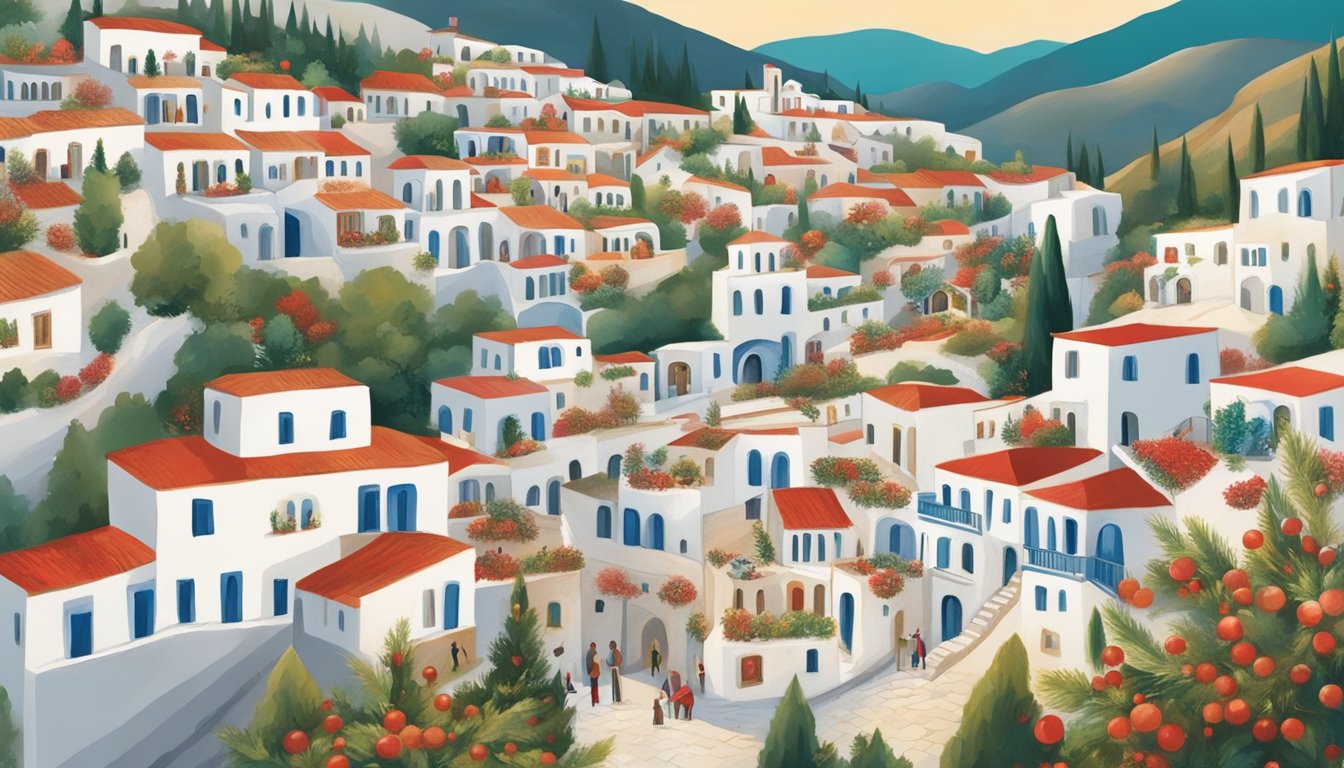
Greek Christmas traditions are richly woven with folklore, where mythical figures play integral roles in the season’s customs. Magic and legends feature prominently in the celebrations, adding a unique dimension to the holiday spirit.
Legends of the Kallikantzaroi
The Kallikantzaroi are a central part of Greek Christmas folklore. These mischievous goblin-like creatures are said to emerge during the twelve days of Christmas, from Christmas Day to Epiphany.
According to legend, they dwell underground, sawing at the world tree in hopes of bringing it down, thus collapsing the world.
It is believed that during the Christmas period, these sprites surface in the human world, causing havoc and engaging in various antics.
Their purpose is to bring chaos, but they are not considered evil; their actions are seen as troublesome and disorderly.
Households performed certain rituals to protect themselves from the Kallikantzaroi. One ritual often included leaving a colander on their doorstep to trick the creatures into counting holes until sunrise, which forced them to hide.
The belief in the Kallikantzaroi underscores the enchantment that folklore brings to the Greek Christmas experience.
Their tales passed down through generations, reflect a love for storytelling and cultural heritage, embodying the magic that folklore brings to Greek Christmas traditions.
Frequently Asked Questions
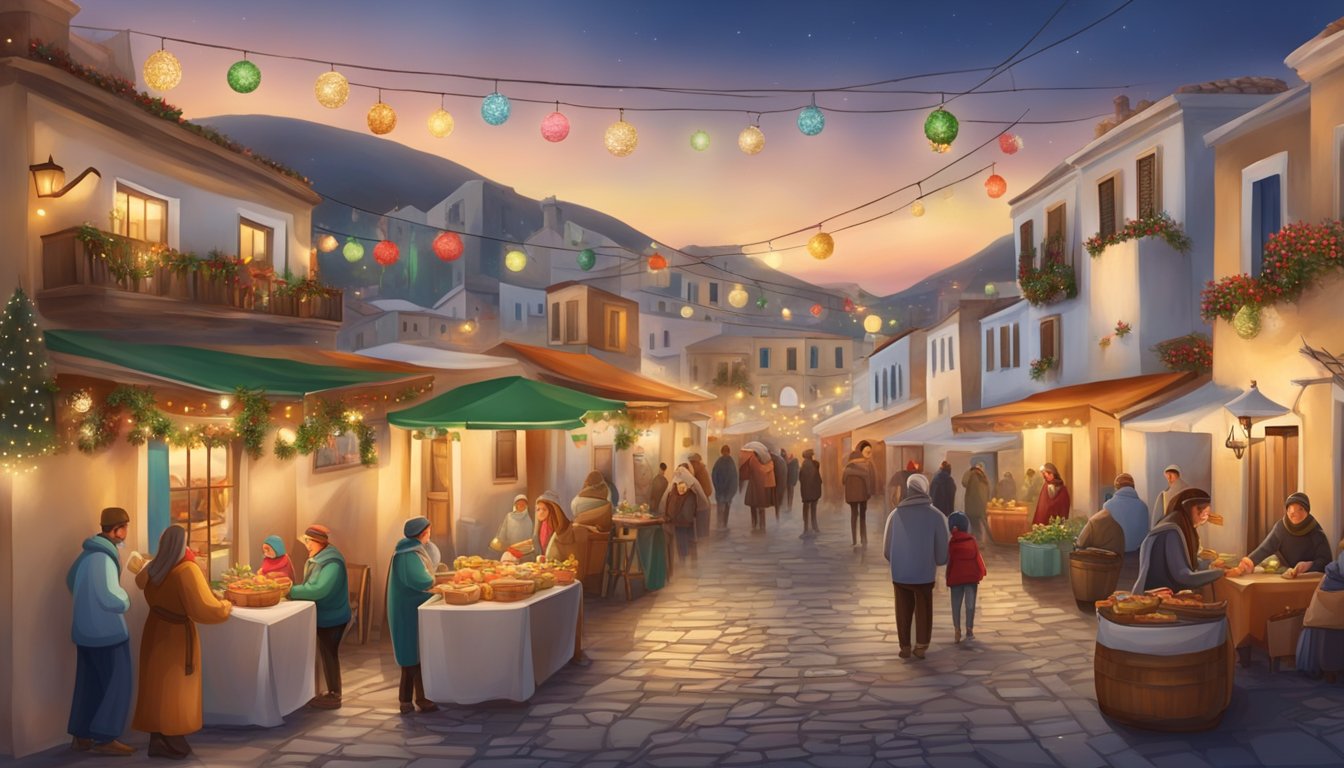
What are some traditional Greek Christmas customs?
In Greece, Christmas customs are rich and varied.
For example, on Christmas Eve, children often go door to door singing carols, or ‘kalanda,’ and Thessaly is renowned for the ‘gourounohara,’ a tradition of pig slaughtering.
Another widespread practice is the “marriage” of firewood, symbolizing the union of male and female elements in the hearth.
What are some hallmark foods enjoyed during Christmas in Greece?
During Christmas, Greeks enjoy an array of traditional foods such as melomakarona, honey-soaked biscuits sprinkled with nuts, and kourabiedes, buttery cookies covered in powdered sugar.
Vasilopita, a cake or sweet bread with a hidden coin, is also a festive staple served on New Year’s Day.
How does the Orthodox faith influence Christmas celebrations in Greece?
The Orthodox Church plays a central role in Greek Christmas celebrations through religious services and customs.
December 6, Saint Nicholas Day, marks the beginning of the Christmas season.
Christmas Day service is a significant gathering for worship. Many homes will keep a fire burning symbolically from Christmas to Epiphany to protect the family from the kallikantzaroi, mischievous goblins believed to surface during the 12 days of Christmas.
What sort of weather can one expect in Greece during the Christmas season?
The Christmas season in Greece features varying weather patterns.
The mainland tends to be cold, with chances of rain and snow in the mountains and an average temperature of around 13 degrees Celsius.
The Greek islands experience a milder and often sunnier climate but can be windy. The larger islands like Crete are notably warmer.
What are the unique decorations often seen during Greek Christmas?
Greek Christmas decorations include the Christmas boat, or ‘karavaki’, a nod to the country’s maritime heritage.
Homes are commonly adorned with evergreen wreaths, while the interior decorations may feature nativity scenes.
The Yule Log, or ‘Christoxylon’, is an important symbolic decoration burned for the twelve days of Christmas.
How is Christmas in Greece a special experience for families?
Christmas is a time of togetherness for Greek families, where intergenerational traditions are passed down and celebrated.
Families gather for large feasts and share in the rituals, such as slicing the vasilopita to bring luck for the new year. It is a celebration of hospitality, generosity, and kinship.

